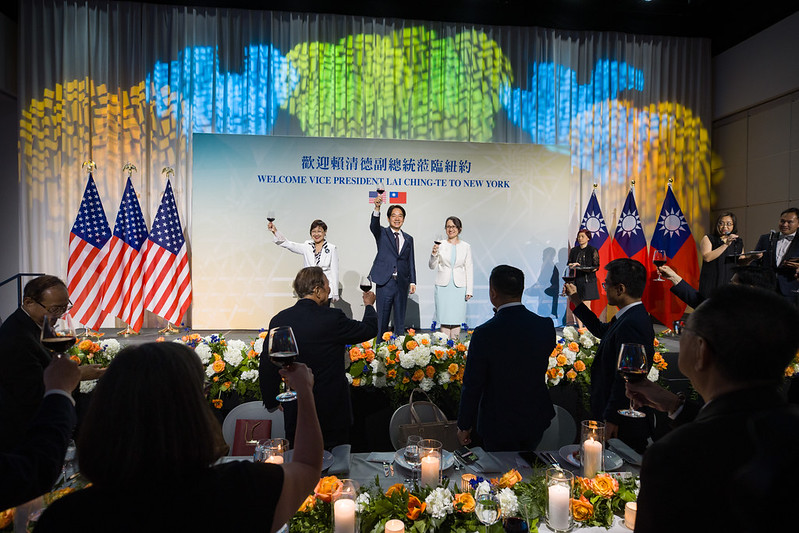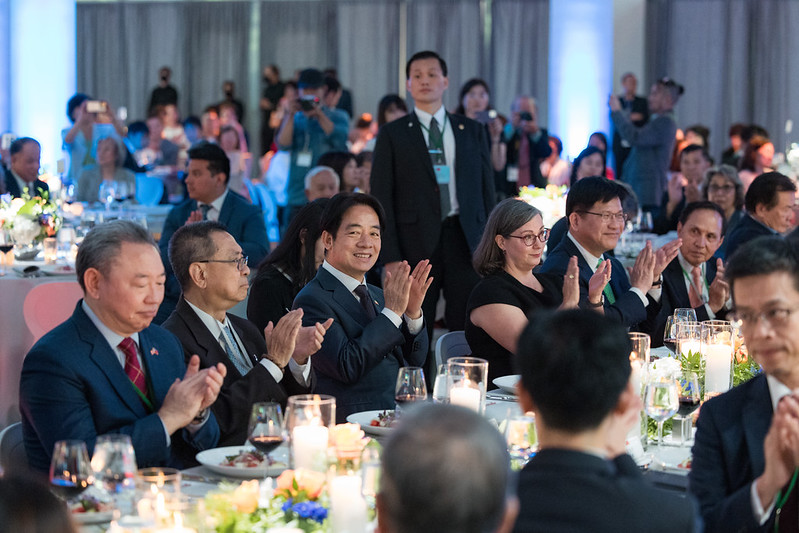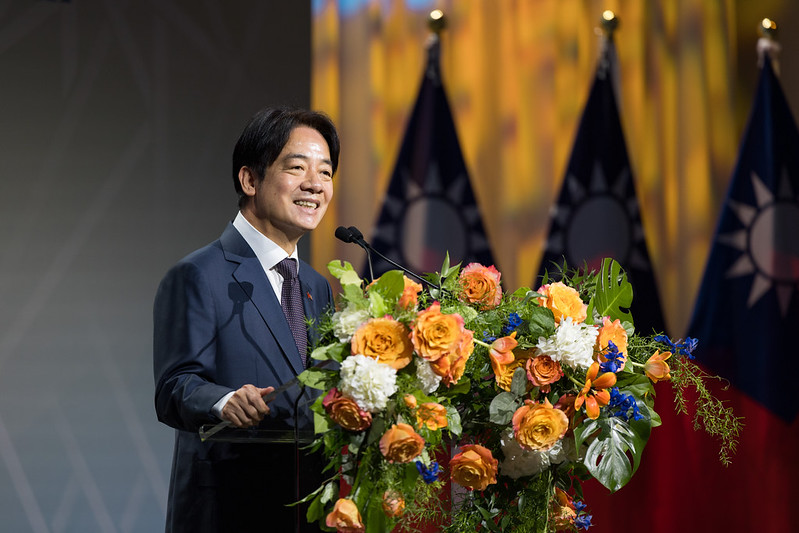News & activities
 News releases
News releases
At noon on August 13 local time (early morning of August 14 Taipei time), Vice President Lai Ching-te and his delegation attended a banquet with the local and Taiwanese overseas communities in New York City, while transiting en route to the Republic of Paraguay to attend the inauguration of Paraguayan President Santiago Peña Palacios. Vice President Lai emphasized that we stand up for our values of freedom and democracy and do not fear or shrink from the threat of authoritarianism, no matter how big it is. The vice president further stressed that Taiwan's belief in democracy acts as a shining beacon for those in the Indo-Pacific region striving for democracy, freedom, and human rights, and said that Taiwan must be a more active player in the global democratic community and bravely promote peace and stability in the Indo-Pacific.
In remarks, Vice President Lai said that the Republic of Paraguay has been an important ally of Taiwan in South America for 66 years. The inauguration of President Santiago Peña Palacios will take place on August 15, he said, and President Tsai Ing-wen appointed him as special envoy to lead a delegation to Paraguay to offer congratulations to the incoming president and convey the warm wishes of the people of Taiwan. Also, it is hoped that this trip will help us strengthen the friendship between Taiwan and Paraguay and expand upon our bilateral collaboration, spurring prosperity for both our countries, he said.
Vice President Lai thanked the United States government for providing support for the transit stop based on the principles of safety, comfort, convenience, and dignity, and also thanked our American friends present at the event for their long-time support for Taiwan. He noted that he was both honored and moved to see so many from the overseas community coming from so many locations to attend.
Vice President Lai quoted the saying that "destiny unites those from afar," adding that the feelings, the values, and the goals that we hold in common have brought us together over great distances here, in New York City – the home of the Statue of Liberty. Our feelings, he said, stem from the fact that our roots are in Taiwan, and that we identify with Taiwan. Our families and friends live in Taiwan, he said, and we experience the happiness and sadness of life together.
Vice President Lai pointed out that there are very few countries in the world like Taiwan. He noted that Taiwan is ranked 140th in the world in area and that it has a population of just 23.5 million, but despite its small size and population it is the 21st largest economy in the world, the 8th largest trading partner of the US, and the 6th most competitive nation in the world. For the seven years from 2016 to now, Taiwan has continued to become more robust, he said, pointing to Taiwan's 70 percent growth in exports and its leap in national GDP from NT$17 trillion to NT$22 trillion. And even in the three years of 2020 to 2022 of the pandemic, he added, Taiwan's economic growth remained the highest among the Four Asian Tigers, and its cumulative economic growth was highest worldwide.
Vice President Lai then pointed out that Taiwan produces over 90% of the world's most advanced semiconductors. As we move into the future, from digital transformation to net-zero transition and seeking greater growth and prosperity, the world will need Taiwan, he said. There are also a number of hidden champions in Taiwan that are crucial parts of global supply chains, he added, noting that this makes Taiwan's role in the world increasingly important.
Vice President Lai explained that during the COVID-19 pandemic, we adopted what came to be known as the "Taiwan model," which incorporates democratic governance and technological expertise in our pandemic response with the dedication of front-line medical personnel and the solidarity of our people supporting government efforts. Not only was Taiwan able to protect the health of its people, he said, it was also able to provide international aid throughout four waves of the pandemic, which allowed the world to see Taiwan as a force for good in the world – to see democratic Taiwan as one with the world.
As an example, the vice president pointed to the Taiwanese people standing with Ukraine just after Russia launched its invasion. We deployed medical teams, sent aid in the forms of funds, manpower, and supplies, and some of our citizens even joined the fight for Ukraine on their own initiative, he said. We will not let any democracy fight alone, he stressed, and for this we have gained the recognition of the global democratic community.
Vice President Lai explained that this is the Taiwanese spirit. It is our optimism and our hope to create a better nation for the next generation, he said, and it is also our genuine warmth and our feeling of responsibility to do our part as a member of the global community. While we encounter difficulties in diplomacy, we continue forward and engage with the world as we move into the future, he said. The vice president said that our roots are in Taiwan, our feelings for Taiwan run deep, and that no matter where we are in the world, Taiwan remains in our hearts.
Vice President Lai said that aside from our shared feelings and identification with the land of Taiwan, we also share a set of values stemming from our belief in freedom and democracy. Democracy, as the word implies, is rule by the people, but the people of Taiwan had to walk a long and difficult road before they were able to be the masters of their own destiny, he said. The vice president noted that part of Taiwan was at one time under the colonial control of the Dutch East India Company; it then became a base for those who wanted to restore the Ming dynasty and overthrow the Qing. And later it came within the compass of the Greater East Asia Co-Prosperity Sphere when it became a Japanese colony, he said, then, with the Republic of China's National Government, Taiwan became a launchpad for the fight against the forces in China.
Vice President Lai observed how the Taiwanese people never give up, and they always keep their sights set on the long game, sticking through to the end even when encountering setbacks in the short term. In our dark times under an authoritarian regime in Taiwan, he said, we fought together to end bans on new political parties and restrictions on the media, repeal sedition laws, and achieve true freedom of speech. He recounted how we fought to lift martial law, and how we worked toward democratic reforms, such as elections for legislative seats and direct presidential elections, that have brought us to where we are today – a society characterized by democracy and diversity, freedom and openness. This, he emphasized, is what we are determined to preserve for the next generation.
Vice President Lai said that because it is democratic, Taiwan walks with the rest of the world, and that the rest of the world moves forward with Taiwan because of democracy. In just the past six months, he pointed out, the US Congress has raised over 30 resolutions and pieces of legislation in support of Taiwan, and we signed the first agreement under the Taiwan-US Initiative on 21st Century Trade, which was recently signed into law by US President Joe Biden. This, the most comprehensive trade agreement signed between Taiwan and the US since 1979, is a sign of deepening Taiwan-US relations.
Vice President Lai mentioned that last month Taiwan and the United Kingdom announced the launch of official talks on an Enhanced Trade Partnership (ETP), which would focus cooperation on the key areas of investment, energy and net zero, and digital trade. While the ETP would provide more economic security between the two countries, it would also be a milestone for Taiwan working together with like-minded countries to create economic growth and prosperity for the Indo-Pacific region.
Vice President Lai said that Taiwan has garnered international support for its diplomatic efforts, which include the establishment of mutual representative offices with Somaliland, the substantive advancement of our ties with the Czech Republic, Slovakia, Lithuania, and other countries, and broad support for Taiwan during the World Health Assembly. He added that political leaders from countries around the world have been visiting Taiwan, demonstrating their support for Taiwan through concrete action, and that all this is testament to the saying that "those who are virtuous do not stand alone," as democratic Taiwan is one with the world.
Vice President Lai said that because of this, here at this critical time, we recommit ourselves to standing up for our values of freedom and democracy and not fearing or shrinking from the threat of authoritarianism, no matter how big it is. As Taiwan's belief in democracy acts as a shining beacon for those in the Indo-Pacific region striving for democracy, freedom, and human rights, the vice president said that Taiwan must be a more active player in the global democratic community and bravely promote peace and stability in the Indo-Pacific.
Vice President Lai stated that everyone has gathered here tonight because of our common goals – safeguarding Taiwan and advancing democracy, peace, and prosperity, so that future generations can enjoy freedom, democracy, and human rights. In order to achieve these goals, he said, we need to be united at home and cooperate internationally. He noted that while our political parties may compete against one another in domestic elections, they should all put our national interests ahead of party interests when facing the threat of authoritarianism, as only by coming together can we win the trust of the international community and garner strong support for Taiwan.
Vice President Lai noted that in recent times, many international meetings, including the G7 Hiroshima Summit, NATO Vilnius Summit, and bilateral meetings between the US and Japan and the US and Korea, as well as other high-level international summits, have all stressed the same point – that peace and stability in the Taiwan Strait is not just an issue for Taiwan, but a global issue that affects all countries. This year, he added, at a European Union summit, the European Council showed particular concern for Taiwan, stating that it "opposes any unilateral attempts to change the status quo by force or coercion."
Vice President Lai also mentioned that last year, Japan released three national defense documents and more recently released a new defense white paper, and that it views peace and stability in the Taiwan Strait as indispensable to the security and prosperity of the international community. Noting that President Emmanuel Macron of France has announced the 2024-2030 Military Programming Law, Vice President Lai stated that this makes France the first major country to pass legislation protecting freedom of navigation in the Taiwan Strait.
Last month, the vice president noted, US President Biden used presidential drawdown authority for the first time to provide Taiwan with US$345 million in military aid in a concrete show of support for Taiwan. The vice president stated that all these acts of support show that Taiwan's security is a global issue, that when Taiwan is secure the world is secure, and that when there is peace in the Taiwan Strait there is peace in the world.
Vice President Lai expressed his belief that Taiwan is on the right path, so we must not abandon that path in fear as a response to the increasing threat of authoritarianism. He said that we must bravely and resolutely continue down our democratic path to strengthen Taiwan.
Vice President Lai stated that he will maintain President Tsai's Four Commitments: our commitment to a free and democratic constitutional system, our commitment that the Republic of China and the People's Republic of China should not be subordinate to each other, our commitment to resist annexation or encroachment upon our sovereignty, and our commitment that the future of the Republic of China (Taiwan) must be decided in accordance with the will of the Taiwanese people.
Vice President Lai emphasized that although the international landscape may be complex, with peace as his North Star and democracy as his compass, he will implement the Four Pillars for Peace – his action plan for maintaining peace and stability in the Indo-Pacific – to enhance Taiwan's self-defense capabilities, strengthen its economic security, deepen our ties with the international democratic community, and promote dignified and reciprocal cross-strait dialogue and cooperation.
Vice President Lai recalled that when he came to New York four years ago and met with many members of our overseas community, he remarked on how the Statue of Liberty has witnessed the arrival of countless immigrants, including members of our community who have gone on to become integrated into American society and cultivate the values of freedom, democracy, and respect for human rights. Stating that after the September 11 terror attacks, the construction of the Freedom Tower showed us the courage of the people of New York, the vice president expressed hope that we can display the same level of courage to build a stronger Taiwan.
Noting that New York is a city of creativity and innovation, the vice president said that we should also use progressive and innovative policy to advance Taiwan's progress and help it become a Taiwan of the world. Since his last visit to New York four years ago, he said that his ideas have not changed and that going forward he will continue to safeguard and strengthen Taiwan and build an innovative and prosperous Taiwan. Vice President Lai expressed his belief that safeguarding and strengthening Taiwan, and building an innovative and prosperous Taiwan, are our shared goals, and that on this rare occasion of being gathered here we should make a beautiful oath together by recommitting ourselves to those very goals.
Also in attendance at the banquet were National Policy Advisors to the President Yee Phong (Alan) Thian (田詒鴻) and Jason Lin (林見松), Secretary-General to the President Lin Chia-lung (林佳龍), Deputy Secretary-General to the President Alex Huang (黃重諺), Vice Minister of Foreign Affairs Alexander Tah-ray Yui (俞大㵢), Representative to the US Bi-khim Hsiao (蕭美琴), Director-General of the Taipei Economic and Cultural Office in New York James K. J. Lee (李光章), Minister of the Overseas Community Affairs Council Hsu Chia-ching (徐佳青), American Institute in Taiwan (AIT) Managing Director Ingrid Larson, President of the Chinese Consolidated Benevolent Association Raymond Tsang (曾偉康), and Chairman of the New York Taiwan Center Su Chun Hwai (蘇春槐). AIT Chairperson Laura Rosenberger participated via video.












